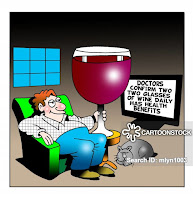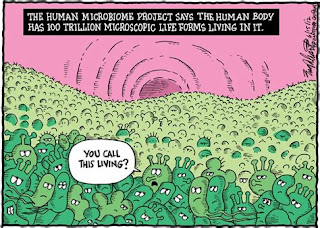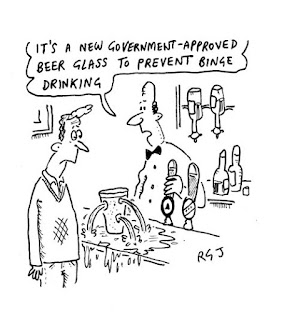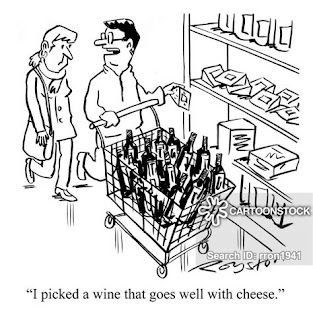SUMMARY
- Alcohol sales and consumption have increased with lockdown measures.
- Alcohol reduces the effectiveness of the immune system and is a risk factor for severe COVID19 and is likely to reduce vaccine effectiveness.
- Alcohol can lower mood, increase anxiety and reduce ability to think, both directly and by reducing the quality of sleep, making coping in lockdown more difficult.
- For people at increased risk of COVID19, alcohol needs to be enjoyed with great care – ideally avoided altogether.
INTRODUCTION
Alcohol in many ways sums up the dilemma for us as individuals and as nations. This was brought home to me early in the pandemic while listening to reports from South Africa that their pandemic driven alcohol ban had reduced trauma admissions by two thirds from 34,000 to 12,000 a week. In other words, banning the sale of alcohol was one of the most positive health interventions imaginable. More dramatic even than the benefits of seal belt legislation.
 |
| Time please! |
Simultaneously of course, businesses went bust, vineyards lost money, and many livelihoods were lost. It seems with alcohol there is a trade off between harms and benefit – the health sector does its best to compensate for a culture which increasingly encourages alcohol use and tolerates the fall out.
An extreme example of an alcoholic nation was USA in the 20’s. Conditions for industrial workers and many others were so hideous and the unregulated culture so malign that huge numbers of men would drink their wages away on weekend benders, leaving families in distress. This ignited a national campaign to ban alcohol altogether. The subsequent illegal distilleries went on to poison many, but the prohibition, and its inevitable ending, brought the insanity of an alcoholic nation to a more regulated order. As in South Africa, prohibition was in many ways a success.
While the effects of heavy drinking are indisputable and self evident, what about the issue for the occasional tipple taken by so many of us, seen as a positive thing to do at the end of a long day, or as a useful social lubricant? Now, the stress of the pandemic is driving many of us to drink more both in the USA and over here. It seems almost half the population are drinking more, and when it comes to our risk of COVID19, this matters.
This post will examine what does alcohol do to the immune system and our ability to get through the lockdown? First, let’s bust a couple of pervasive myths.
Alcohol Myths
1. “Moderate drinking helps you live longer” Observational studies and the subsequent media reports often claim people drinking moderate amount of alcohol live longer. This is called the “J shaped curve”- that is, a certain level of alcohol intake is best, and very low or no alcohol is associated with worse outcomes.
Less likely to make headlines is that the association is demonstrably not evident in larger, longer studies which control for low intake or abstinence due to other illnesses or indeed, ex-alcoholics. In other words, the J shaped curve does not exist – the more you drink, the more its impact.
2. “Moderate drinking is good for the brain” Throughout my career, I noted authoritative reports that drinking alcohol is associated with improvements in congitive function in the elderly. For me this never made sense,
There is no doubt that when the structure of the brain is examined over time, any amount of alcohol seems to damage our ability to think and process information. And just like any other toxin, the damage is related to dose.
The alcohol paradox explained: to put it simply, many of us drink when we socialise, go to the pub, out for a meal with friends or family or while doing something that is fun, celebratory and social.
The powerful effects of these positive experiences have a huge benefit for the mind and body which mask the damage done by alcohol. Enjoying these events without alcohol would be ideal for health, but for many in our culture that would be a novel experience. Drink alone and you get the worst of both worlds.
This paradox infiltrates a good deal of research on alcohol with inevitable suggestions that a little does you good, with practical implications which include light taxation and decreasing cost. It is being positively encouraged when compared to tobacco.
Alcohol is toxic to the cells of which we are made, at any dose or frequency. For any of us it is a trade off between short term enjoyment and health which we decide for ourselves, but the pandemic does rather change that balance when thinking of a drink or three.
So let’s have a look at the direct effects of alcohol on the immune system and COVID19, then a look at its effect on the brain (who we are) and the ability to maintain mental health during the lockdowns.
Surviving COVID19 – alcohol and the immune system
So what happens after a drink apart from the obvious effects on the brain.
First, alcohol directly damages the cells lining the gut, causing irritation to cells in the stomach and heartburn. It goes on to increase the permeability of the gut wall though which it passes and thus absorption from the bowels of lots of unwanted chemicals and bacterial debris. These hit the first filter of all we consume, the liver – hence its impact there. Lower down the gut, it also directly damages the quality of the 100 trillion bacteria, and 500 trillion viruses which are our microbiome and which also have important roles in immunity.
After absorption, alcohol goes on to affect every cell in the body, by altering cell membranes critical for the integrity and function of every cell, interfering with the ability of cells to divide and reproduce and through the effects of its most toxic waste produce – acetaldehyde. The most significant impacts are on liver, brain and immune cells, but the fact that heavy drinkers are more vulnerable to respiratory distress also hints that there are impacts on the lungs too.
Of particular relevance to the pandemic, is the damage done to our armies of white blood cells, essential for beating off viruses to ensure mild infections, (innate immunity) or fighting back when these are insufficient (acquired immunity). With regular alcohol intake this leads to increased vulnerability to infections including COVID19.
For instance, people with heavy intakes of alcohol do worse when it comes to pneumonia, HIV and TB – that has been know for some time; but lesser amounts have an effect particularly on the monocyte, one of our white cells on the front line against infection. Alcohol leads to these important cells making less type-1 interferon which damps down infection. It also means they overproduce inflammatory cytokines which can signal infection, but also damage lung tissue – just what happens with Sars-Cov2.
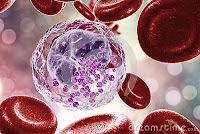 |
| Immune cells work best sober! |
That is not all; alcohol changes the number of T cells responsible for signalling the attack from COVID 19 and killing it directly, and the B cells which produce critical antibodies. Quite a cocktail!
This suggests that having alcohol in your system can make it easier for viruses to overcome our first line defences whose efficient operation leads so many people to have a mild, manageable illness and worsen the complications with a more severe infection. This is why regular alcohol intake makes infections more common and makes them more severe.
WHO have given advice on this and acknowledge that with home deliveries, the stresses of lockdown and time to spare, it can be easier to drink more often and to drink more. They state the best advice, in terms of pre-habilitation, is not to drink at all.
For some this will seem too harsh, but does particularly apply to those affected by other illness already, the older population and those who seriously want to reduce their risk. See below.
Surviving lockdown – alcohol, the brain and the mind:
There are many mental challenges of lockdown, ranging from keeping our spirits up to dealing with mental illness, particularly depression and anxiety. During work as a “Healthy Living Clinic” doctor, I have had to define the issue of the effect of alcohol on brain health, so people with MS can make informed choices. This information is relevant here.
There is plenty of good research on how alcohol damages the brain. It is a major cause of dementia, being responsible for 10-24% of nursing home dementia cases. In terms of MS, alcohol drives increased disability and progression of the illness, even, I’m afraid to say, the occasional tipple.
 |
Heavy drinking is one thing – it alters brain immunity, causes brain cell death and eventually shrinks the brain, but lesser amounts of alcohol has an impact too. Binge drinking induces genes responsible for the specific immune system protecting brain cells and causes their increased excitability and vulnerability to oxidative stresses.
Damage to the frontal lobes lead to behavioural changes which include, would you believe, more likelihood to feel the need for a drink – there is a biological basis for addiction.
While alcohol is seen as a social lubricant, I have memories of the alcohol induced chaos of A+E units on weekends, trauma, alcohol fuelled domestic violence and the psychiatric illness evident in my clinics which are also hallmarks of our alcohol friendly culture. Alcohol induced behavioural changes bring out the worst in many people and my own adolescent binges were not my finest moments.
 |
| Watch out for your hippocampus! |
Binges also affect the ability of brain cells to go through their life cycle, inhibiting the increased growth cells go through just before they divide. This is particularly important in the hippocampus, a part of the brain responsible for memory and learning, and the one place in the brain where new cells can be formed, and therefore where the cell cycle is important. The number of cells on the hippocampus is reduced by a single episode of heavy drinking, an effect which persists even a month later.
It appears the most dangerous phases of life for the brain when it comes to alcohol are during adolescence when the brain is still developing, and the over 60’s who are trying to hang on to declining brain function. We are living longer and so maintaining brain health is ever more important. This is not academic, brain health means out ability to think, to made decisions, to experience emotions and to remember. In other words, who we are.
So it is important to be aware that alcohol damages the brain, and the more regular and higher the intake, the more the damage. The more intermittent and smaller the amount, the less the damage. The only way to have no damage is to have no alcohol.
It also raised the question of what exactly is a binge? This varies from person to person, but for me is as little as two glasses of wine. I know this because I can feel clear loss of brain function the next day. Any hint of a hangover means we have drunk too much. This might seem an over cautious counsel of perfection, but older people who are vulnerable to alcohol related brain damage are also vulnerable to COVID19.
Effect on my brain.
As I said, I like the occasional tipple, usually with friends but sometimes in the evening. However, my MS has sharpened my awareness of problems after even one drink. Memory, thinking and decision making skills are impacted. I have to be honest and state that these are all significantly worse after even one glass of wine. Writing this is blog becomes slower, I re-write it more, I get stuck, I ruminate more, I see the negative in things. So why do I do it? What to do?
What to do – ‘sensible’ drinking
For many people at low risk the impact of alcohol on our ability to fight off Sars-Cov2 is not likely to be foremost in the mind. Yet even for them avoiding excess intake could well mean less serious infections as well as improvements in mood, thinking ability, mental health and the proper functioning of every single cell in the body.
Drinking regularly causes its own problems for everyone, at whatever dose, so too does binge drinking. Bear in mind too that “sensible drinking” as suggested by government recommendations, is not “safe” drinking, just a political decision based on the trade off between the health and economic considerations seen so vividly in South Africa.
For women: Women are more vulnerable to all the adverse effects of alcohol, perhaps because of the lower levels of the enzyme needed to process and eliminate alcohol from our body.
That younger women are now drinking as much as men means that women are likely to suffer alcohol related illness more. This applies to COVID19 too. Women are at slightly lower risk of hospitalisation and death from COVID19, but the impact of alcohol could well reverse the benefit of gender seen in terms of hospital admission and death.
For those at risk from COVID19, alcohol intake really matters. For anyone who already has heart or lung disease, diabetes, metabolic issues (overweight), unfit, over 50, or worried about COVID19, then avoiding alcohol altogether makes perfect sense. With lockdown, drinking in isolation means the positive social context is gone, leaving the transient mellowness of alcohol dwarfed by its negative effects on our immunity, our brain, our minds, the self and perhaps those around us.
For anyone waiting for the vaccine: Russian investigators are the first to advise people not to drink before or after a vaccine . While we wait for more research on this (if it ever arrives), it is reasonable to assume that alcohol reduces the likelihood of an effective immune response.
As a minimum, it make perfect sense to avoid drinking as soon as you get the appointment and in my opinion, for at least a few weeks after vaccination.
The implication is clear, you can book a jab, but you can’t book an infection – to be fully COVID ready, there should be a little alcohol in your blood as possible, and ideally none.
For me, in the process of writing this post, I have decided to leave my remaining three bottles of wine in the cupboard. I will resist the temptation for a glass in the evening until the pandemic is over and I can enjoy during special occasions with with friends. Yet, I can’t help but think that with MS even that is a step too far. Another month or two of abstinence might well and end to my association with alcohol altogether – for me, that would be wise.
Freedom – The other advantage of leaving it be it is that an evening drink can become a part of the daily routine very easily. We can all become dependent on our evening tipple and consider ourselves to be incapable of coping without it. This constant level of desire is part psychological and part due to alterations in the structure of our brain – a very big and very addictive Catch-22. In effect, a mild hangover becomes the ‘normal’ sate of mind. It isn’t.
The ability to take it or leave it gives freedom from need and desire. Better mood, concentration and thinking ability can help us see things more clearly and focus on the positive things in our lives. The ability to leave it altogether improves our health as long as we maintain the alcohol-associated aspects of our lives which bring us pleasure and joy.
Personally, I want to get through lockdown and restrictions with as many of my marbles left as possible. I also want to be as ready as I can be if I do come across the virus, or indeed the vaccine. I want the mildest COVID19 experience and the best vaccine result I can plan for. I want my white cells to be on their toes!
That wine will say in the cupboard.
Cheers!
